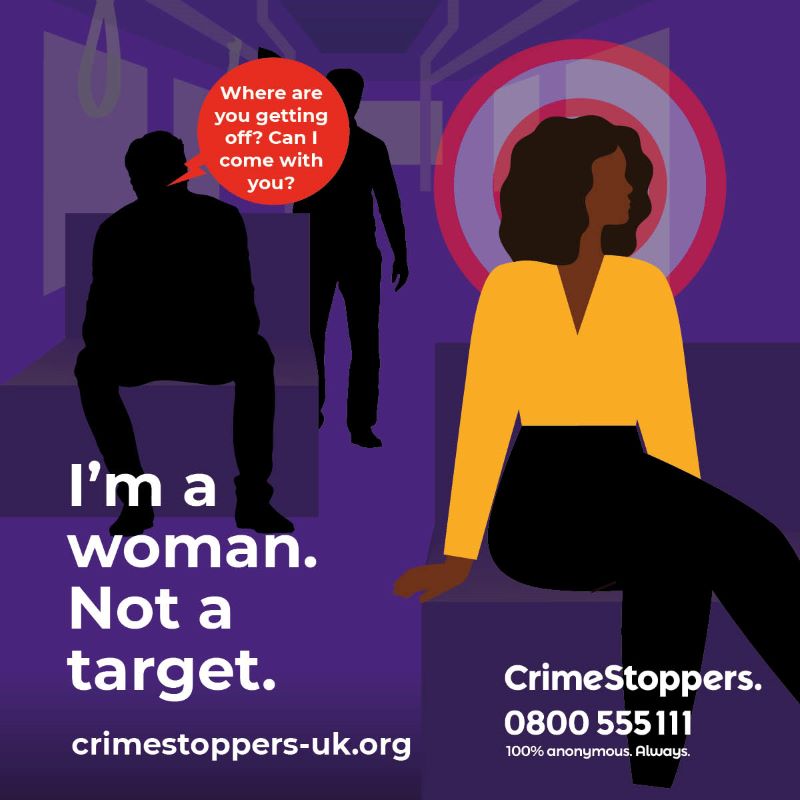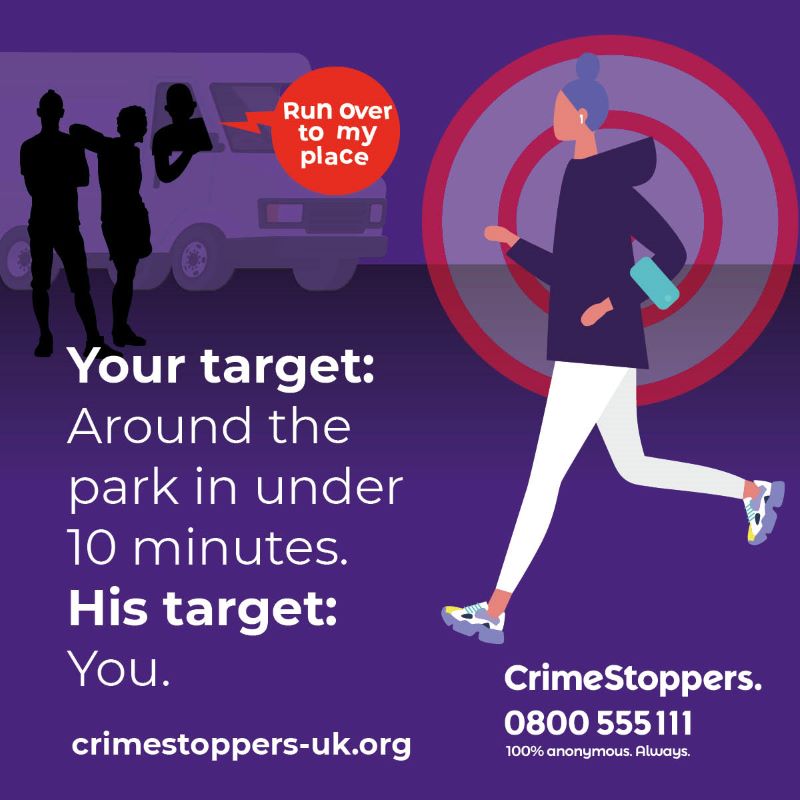Speaking up anonymously to challenge sexual harassment is at heart of our new campaign
We are targeting the issue of sexual harassment in public spaces with a new campaign, as research shows over 70 per cent of women in the UK have experienced this.*
Our new campaign highlights what sexual harassment is and encourages those who see it happening to report perpetrators to our charity 100% anonymously.
Recent figures show that one in three women have been victims of sexual harassment or sexual offences while commuting by train and tube** and a survey we conducted with the University of Suffolk revealed that shockingly around one in six people had their first experience of sexual harassment in public when they were aged just 10 or even younger. ***
Sexual harassment also referred to as ‘unwanted sexual behaviour’ or ‘street harassment’, is all unwanted behaviour of a sexual nature that violates a person’s dignity, making them feel intimidated, humiliated and degraded.
Sexual harassment in all its forms, whether experienced in person or online, can have serious and lasting effects on its victims. No matter their age, gender or sexual orientation, sexual harassment can happen to anyone – it’s never OK and it’s never an individual’s fault.
When behaviour is left unchecked, it could escalate into perpetrators moving on to more extreme and dangerous types of harassment.
Sexual harassment can look like:
- Flashing/exposure - for example, exposing genitals in a public place.
- Sexual comments/gestures - behaviour such as 'catcalling' and 'wolf-whistling', sexual propositions (verbal and non-verbal), and/or making comments about someone’s body.
- Stalking - classed as a pattern of fixated or obsessive behaviour which is repeated, persistent, intrusive and causes fear of violence or engenders alarm and distress in the person targeted.
- 'Cyberflashing' - for example, sending or showing sexual images and/or website content/links, commonly transmitted via AirDrop or Bluetooth.
- Intrusive/persistent questioning - when you’ve made it clear you don’t want to talk to someone - e.g. “Have you got a boyfriend/girlfriend?”, “Where are you going?”
- Touching or rubbing against the clothed body of another person in a crowd (e.g. on a busy train or bus) as a means of obtaining sexual gratification.
- Watching explicit content in public areas - e.g. pornography, including in some cases trying to show this content to others nearby.
- 'Upskirting' - placing a camera beneath a person’s clothing to take a voyeuristic photograph without their permission.
- Standing too close when there is no need to or invading personal space - e.g. somebody standing/sitting unusually close to you on a bus or train service that isn’t very busy.
- Physical and/or sexual assault, rape - e.g. non-consensual touching, grabbing, groping, stroking, kissing. Sexual intercourse of any kind without consent.
We all have the power to help stop this from happening by challenging sexual entitlement and reporting it.
If you see a crime in action, call 999. If you have information on the perpetrator and would prefer to stay anonymous, tell our charity what you know by calling 0800 555 111 at any time or complete an anonymous online form on this site or Fearless.org for young people. The police can be contacted on 101 if you are happy to reveal your identity.
What information could help stop a perpetrator?
- Details on who they are or what they look like.
- Details on the location, date and time it happened.
- Details on the crime itself – what type of harassment was being committed.
- Details on whether the perpetrator has been involved in multiple offences of sexual harassment.
- If you see recorded footage of sexual harassment posted online: details or links of the site/platform where it was posted, who posted it, and when.
Due to our guarantee of anonymity, we cannot take information from victims who need to speak directly to the police. They can also seek help from Victim Support – who provides specialist practical and emotional support to victims and witnesses of crime on 08 08 16 89 111.
* 2021 UN Women UK YouGov survey ** One Poll survey August 2023
***Sexual Harassment in Public Spaces University of Suffolk and Crimestoppers Report, January 2023. An online survey was completed by 1,800 respondents across the UK. All participants responded to our call via social media to share their views and experiences about sexual harassment. Therefore, the participants were self-selecting and not random. Around one in six participants’ (16.8%) first experience of sexual harassment occurred when they were aged 10 or younger (3.7% aged 0-5, 13.1% aged 6-10).

